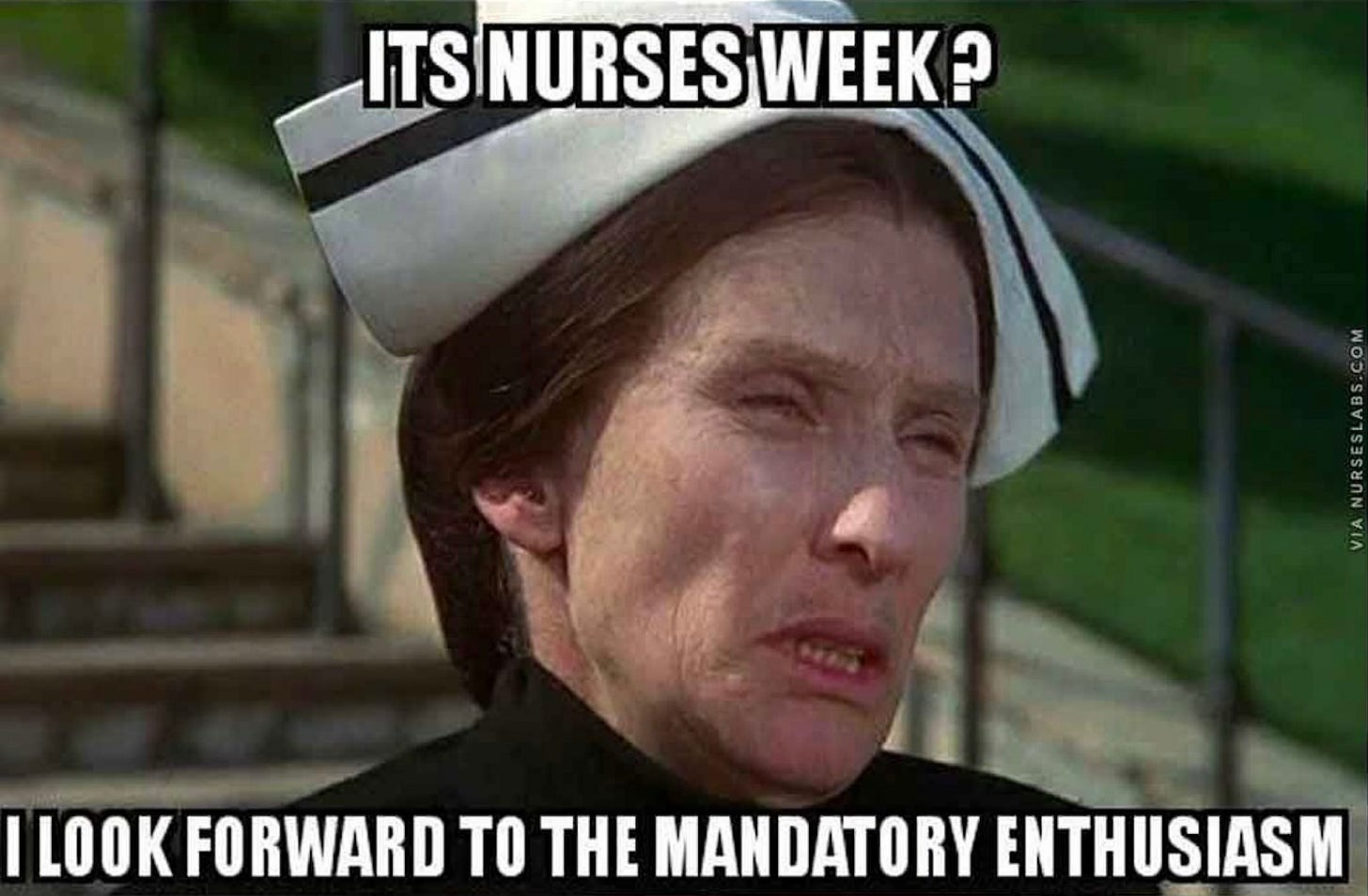Hello All,
First, thanks for all the good wishes in response to my book sale announcement. Apologies that I didn’t write back to everyone. As I get more into my book writing I have less attention for email, but please know how much I appreciated all the messages and enthusiasm. I feel good knowing there is such interest in finding hope in health care. Your excitement will inspire me!
Now on to the topic at hand: Nurses’ Week. For those not in the know, Nurses’ Week runs every year from May 6-12, ending on May 12 because that is Florence Nightingale’s birthday. I’ve been invited to speak at hospitals for nursing week and have always been proud to go, especially after the pandemic, but this year I gave more thought to my own ambivalence about this week of celebration granted to nurses.

In my experience, most hospitals don’t do that much for Nurses’ Week. There might be banners and friendly emails, a lunch provided by one doctor’s group or another, but no hospital or hospice agency where I worked put much effort into Nurses’ Week, and yet we were still supposed to be grateful for the little they did. If nurse readers have different experiences, please share them in the comments, but I’d also like to hear if my description resonates with your hospital’s or agency’s attitude toward Nurses’ Week.
My editor at Cancer Nursing Today really liked the column below, in which I argue that nurses don’t want a week of limited and mediocre celebration, we want to be paid what we deserve. I’m quite proud of it, but while writing it I had the strangest experience of hearing a voice in my head saying, “You’re a communist! You’re a socialist!” As if wanting nurses to be paid adequately reflects an ideology beyond the ideas of simple fairness and just rewards. My thinking showed me how deeply I have gotten pulled into what I call the hyper-capitalist mindset that now pervades the U.S. I want hospital management to pursue fewer expensive mergers and building projects, and maybe to take pay cuts themselves, in order to compensate nurses better. If that makes me a communist, then OK, I’m a communist (and a socialist?), but I would say that what it actually shows is how much I care about patients and the people who care for them 24/7.

Slapping a label on a position in order to dismiss it out of hand is a tried and true rhetorical technique for not taking an idea seriously. And I’m upset that I was doing that to myself! But I wrote the column I wanted to write anyway, and this newsletter has given me the opportunity to explore the thinking that made the process a lot harder than it needed to be. My own hope is that ruminating in this way will make writing about pay equity and fair income distribution in health care easier next time.
Opinion: To Really Honor Nurses, Pay More
Nurses’ Week this year ran from May 6-12, as it always does. Hospitals over the country, I’m sure, gave nurses pizza parties and talked about honoring them. Chipotle and Dunkin’ Donuts, among other national food chains, got into the act by offering nurses a chance to win a burrito or get a free coffee. When I was a new nurse, I thought Nurses’ Week offered a nice bit of recognition. As I worked longer in nursing, I began to see the holiday more cynically as a sop to an undervalued profession, similar to Teachers’ Week and Administrative Professionals’ (formerly Secretaries’) Week. I propose that instead of having a “Nurses’ Week,” let’s truly recognize nurses by paying them what they deserve.
It’s unfortunately true that careers that get recognized with a day, or a week, tend to be relatively low-paid and low status. Consider that there is no such thing as “Hedge Fund Managers’ Week” or “Silicon Valley Billionaires’ Week” or “Hollywood Executives’ Week,” because those professions have won the life reward lottery and make vastly more money than nurses. Most physicians also earn a lot more than nurses do, as do high-level hospital administrators. And don’t get me started on the idea that executives and physicians deserve their high salaries because they are uniquely amazing at their jobs. Doctors and CEOs are talented, of course, but nurses are, too, and also, as became obvious during the pandemic, essential, life-saving workers, unlike hospital executives.

As for me, I’ve been enjoying reading lately. When writing my first three books I found it very hard to read anything. For this book, though, I find myself craving reading. My latest plow-through was WNBA star Brittney Griner’s new memoir Coming Home, which I really enjoyed despite its sometimes grim content. The voice in the book is honest, unsentimental and generous and I found Griner’s story quite affecting. I’m also still learning Spanish and really taking pleasure in that. Learning French and German felt like work to me, but I find Spanish playful and fun. That feeling is probably helped along by doing DuoLingo, which is designed like a video game, but whatever the reason, I like that I’m enjoying the learning.
Warmer weather seems to definitely be here to stay and it feels good!
Hugs to all,
Theresa







Exactly. In their personal lives, women often like gifts as a love language. In a woman dominated profession in professional settings, gifts instead of the currency of professionalism (salaries plus benefits) feels like a slap in the face to me. I agree with Diana that adequate compensation is not the only obstacle to me and others returning to floor nursing. Safe nurse: patient ratios would really get my attention (max 1:4). Actually providing enough CNAs without pulling them to other floors ranks right up there next to nurse ratios because not enough CNAs means that my patient ratio on a given day is actually worse; having enough CNAs means providing CNAs also with adequate compensation, lunch break coverage, etc. I would also require enough essential resources to be efficient (WOWs), a way to safely allow nurses to take real lunch breaks, andhaving a voice in decisions that affect nurses. Hospitals haven't begun to make acute care nursing a sustainable profession, partly because hospital administrators don't know enough about the complexities of an acute care nurse's day.
I'm with you on hating the Hallmark cliched platitudes of Nurses Week/Day. I don't think pay is the answer. We've increased the pay of nurses significantly over the past two decades (~$69K in 2011 to ~$94K in 2023, average). Primary care practices now up-skill medical assistants to replace RNs, arguing that they can't afford RNs. I think it's about changing the work environment: staffing ratios, respect for knowledge and skill, decision-making, support, flexible scheduling, etc. You can't pay me enough to go back to floor nursing in most places.